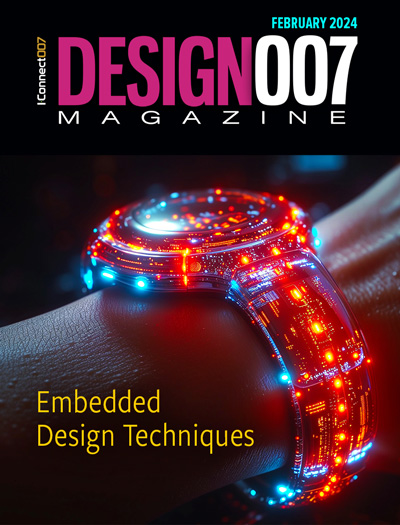-

- News
- Books
Featured Books
- design007 Magazine
Latest Issues
Current Issue
Level Up Your Design Skills
This month, our contributors discuss the PCB design classes available at IPC APEX EXPO 2024. As they explain, these courses cover everything from the basics of design through avoiding over-constraining high-speed boards, and so much more!

Opportunities and Challenges
In this issue, our expert contributors discuss the many opportunities and challenges in the PCB design community, and what can be done to grow the numbers of PCB designers—and design instructors.

Embedded Design Techniques
Our expert contributors provide the knowledge this month that designers need to be aware of to make intelligent, educated decisions about embedded design. Many design and manufacturing hurdles can trip up designers who are new to this technology.
- Articles
- Columns
Search Console
- Links
- Events
||| MENU - design007 Magazine
PCB Carolina: Alex Barile Studying for His Dream Job
December 22, 2022 | Andy Shaughnessy, Design007 MagazineEstimated reading time: 4 minutes
Visitors jammed the aisles at PCB Carolina, but I noticed someone who stood out from the crowd: Alex Barile, a student at Wake Tech, a community college in North Carolina. Alex loves the physical and mechanical aspects of machinery, but learned pretty quickly he doesn’t want to be sitting behind a desk all day. He’s found a major that fits both his personality type and professional interests.
Andy Shaughnessy: How’s it going, Alex?
Alex Barile: It’s going well. Thanks for asking.
Shaughnessy: I understand you are a student volunteering for the show. Tell me about your major and what made you get interested in electronics.
Barile: Originally, I was majoring in electrical engineering, but after talking to other people who work in the industry, it seemed more abstract and less field work. I really wanted a mixture so that I wasn’t stuck at a desk for the rest of my time in that field. I changed majors a little over two years ago and I’ve been enjoying it since.
Shaughnessy: What school are you in and what’s your major?
Barile: I’m at Wake Tech, and my major is electronics engineering technologists. I’ve been told that it’s like a go-between for entry level technicians and engineers; we do field work, take measurements, and then we give those measurements back to engineers who tell us how to use those to improve our physical or field devices.
Shaughnessy: A lot of our readers sit behind a workstation designing a board and they really like it. But you wanted something different?
Barile: Yes. I like getting my hands dirty, doing testing, installing and uninstalling equipment, even some of the upkeep, which might seem tedious for some. I like machines and the physical and mechanical aspects of electronics. It’s what makes this field better for me. I see a lot of people get into coding, and I understand the software is becoming increasingly important, but for me, there’s nothing more dull than programming all the time. I understand it’s a part of everything, but I want it to be a very small part of what I do. Assembly is kind of fun too because it gets right down to the hardware. You can see the bits switching.
Shaughnessy: What are your classes like?
Barile: The classes are fun and varied. There are so many courses, whether it’s sensors and transistor boosters, PLCs, or communications equipment. It generally shapes up to be that you’re a master of none, jack of all trades.
Shaughnessy: It sounds like you’re learning a little of everything. Are you learning Maxwell’s equations?
Barile: We have done that before. We have three circuit analysis classes that everybody goes through: Circuit Analysis, and Analog Electronics I and II. That’s where you get all your Shockley’s equations and learn about barrier voltage, diodes, and so forth. It’s where you study the most electrical engineering content.
Shaughnessy: Will the school provide leads on jobs for you? Do you get some direction on where to go once you’re done?
Barile: You just meet people because a lot of these classes are so small, and a lot of those who are coming into this sort of program for this degree are already in the industry. For example, I met a man named Mr. Paisano who works at Siemens, and he talked to us about internship opportunities at Siemens. In four months, three students already have jobs lined up.
Shaughnessy: I’m curious what would you describe as your perfect job?
Barile: If I had to pick a perfect job, it would be designing CPU or GPU architecture for a company like AMD or Radeon, or maybe Intel. I think it would be the most fun for me because I really like the DIY PC market. It’s what got me into electronics in the first place.
Shaughnessy: You mentioned that you had been building desktops.
Barile: I started in 2019, and I was buying hardware used and new, and I would incorporate that into my systems. It’s sort of amateur system integrator work. Sometimes I would do it all on parts that were my own choice. Other times I would do it where I would take custom orders from people. They would send me a parts list and then I would charge 10% on top of that. I would build them a system. It sounds straightforward, but there’s a lot that gets wrapped up and complicated with doing that sort of work. You run into troubleshooting all the time, and you’re doing a lot of that over the phone. You run into new problems that you’ve never encountered before. For example, I had to learn how to test memory, which can be really hard. So, it comes with all sorts of challenges.
Shaughnessy: That’s great experience, and that will come in handy. So, where are you from originally?
Barile: I grew up in Apex, North Carolina, then lived at the border of Holly Springs. Now I live in the Crossroads area of Raleigh. It’s loud sometimes, but I like living here. The opportunities are good.
Shaughnessy: It’s like a mini–Silicon Valley.
Barile: It’s probably one of the best places for IT jobs in the whole country, outside of Texas and California where all these big tech companies are.
Shaughnessy: What brings you here to the show? What were you hoping to find?
Barile: I hope to see the types of people who work in these industries, learn about company names that I’ve never heard before, find people who are looking for help and make connections. I think is what a lot of people are here for.
Shaughnessy: Great to meet you, Alex. I’m sure you’ll make great connections.
Barile: Nice talking to you.
Suggested Items
AIM Solder Signs Shinil Fl Ltd. as New Distributor for Korea
05/08/2024 | AIM SolderAIM Solder, a leading global manufacturer of solder assembly materials for the electronics industry, is pleased to announce a new distribution partnership with Shinil Fl Ltd., a prominent supplier of technological solutions in the SMT and semiconductor sectors.
KYZEN’s Adam Klett to Keynote at SMTA Electronics in Harsh Environments Conference
05/07/2024 | KYZEN'KYZEN, the global leader in innovative environmentally friendly cleaning chemistries, announced today that KYZEN’s Director of Science, Adam Klett, PhD will present as a keynote speaker at the SMTA Electronics in Harsh Environments Conference. The event is scheduled to take place May 14-16, 2024 at the Technical University of Denmark in Copenhagen, Denmark.
Altus Equips SSTL with Advanced Cleaning Technology for Electronics
05/07/2024 | Altus GroupAltus Group, a leading supplier of capital equipment for the electronics manufacturing industry, has announced the successful installation of an advanced PCBA cleaning system at Surrey Satellite Technology Limited (SSTL).
GPV's Handover of Refurbished Factory Building
05/07/2024 | GPVOn 6 May 2024, Bjorn Fiskers, MD at GPV Electronics TH in Thailand and his team were handed the keys to our refurbished factory building, adding another 7,000 sqm to our current 15,000 sqm electronics factory. Our electronics factory in Thailand will comprise of a total of 22,000 sqm.
New Yorker, Major League Electronics Sign New Franchised Distribution Agreement
05/06/2024 | New Yorker Electronics Co.New Yorker Electronics, global distributor of electronic components, recently announced a new franchised distribution agreement with Major League Electronics, renowned manufacturer of interconnect products.


